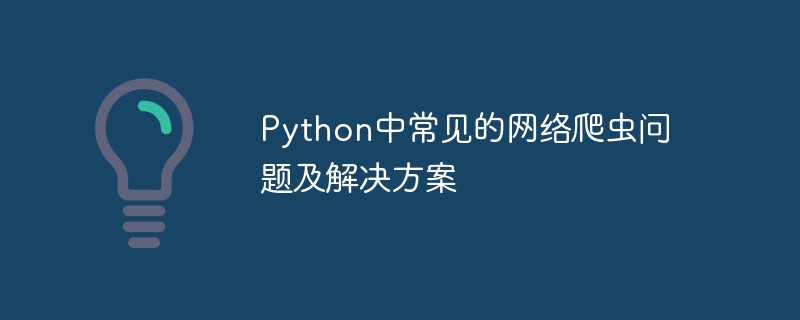

Python における Web クローラーの一般的な問題と解決策
概要:
インターネットの発展に伴い、Web クローラーはデータ収集と情報の重要な部分になりました。分析ツール。 Python は、シンプルで使いやすく強力なプログラミング言語として、Web クローラーの開発に広く使用されています。しかし、実際の開発プロセスでは、いくつかの問題に遭遇することがよくあります。この記事では、Python における一般的な Web クローラーの問題を紹介し、対応する解決策を提供し、コード例を添付します。
1. アンチクローラー戦略
アンチクローラーとは、Web サイトが自身の利益を保護するために、Web サイトへのクローラーのアクセスを制限する一連の措置を講じることを意味します。一般的なクローラ対策戦略には、IP 禁止、検証コード、ログイン制限などが含まれます。いくつかの解決策を次に示します。
import requests def get_html(url): proxy = { 'http': 'http://username:password@proxy_ip:proxy_port', 'https': 'https://username:password@proxy_ip:proxy_port' } headers = { 'User-Agent': 'Mozilla/5.0 (Windows NT 10.0; Win64; x64) AppleWebKit/537.36 (KHTML, like Gecko) Chrome/71.0.3578.98 Safari/537.36' } try: response = requests.get(url, proxies=proxy, headers=headers) if response.status_code == 200: return response.text else: return None except requests.exceptions.RequestException as e: return None url = 'http://example.com' html = get_html(url)
import requests import random def get_html(url): user_agents = [ 'Mozilla/5.0 (Windows NT 10.0; Win64; x64) AppleWebKit/537.36 (KHTML, like Gecko) Chrome/71.0.3578.98 Safari/537.36', 'Mozilla/5.0 (Macintosh; Intel Mac OS X 10_14_3) AppleWebKit/537.36 (KHTML, like Gecko) Chrome/71.0.3578.98 Safari/537.36', 'Mozilla/5.0 (X11; Linux x86_64) AppleWebKit/537.36 (KHTML, like Gecko) Chrome/71.0.3578.98 Safari/537.36' ] headers = { 'User-Agent': random.choice(user_agents) } try: response = requests.get(url, headers=headers) if response.status_code == 200: return response.text else: return None except requests.exceptions.RequestException as e: return None url = 'http://example.com' html = get_html(url)
2. ページの解析
データをクロールするとき、多くの場合、ページを解析して必要な情報を抽出する必要があります。 。以下は、一般的なページ解析の問題とそれに対応する解決策です。
import requests from bs4 import BeautifulSoup def get_html(url): headers = { 'User-Agent': 'Mozilla/5.0 (Windows NT 10.0; Win64; x64) AppleWebKit/537.36 (KHTML, like Gecko) Chrome/71.0.3578.98 Safari/537.36' } try: response = requests.get(url, headers=headers) if response.status_code == 200: return response.text else: return None except requests.exceptions.RequestException as e: return None def get_info(html): soup = BeautifulSoup(html, 'html.parser') title = soup.title.text return title url = 'http://example.com' html = get_html(url) info = get_info(html)
from selenium import webdriver def get_html(url): driver = webdriver.Chrome('path/to/chromedriver') driver.get(url) html = driver.page_source return html def get_info(html): # 解析获取所需信息 pass url = 'http://example.com' html = get_html(url) info = get_info(html)
上記は、Python における一般的な Web クローラーの問題と解決策の概要です。実際の開発プロセスでは、さまざまなシナリオに応じてさらに多くの問題が発生する可能性があります。この記事が読者に Web クローラー開発の参考と支援を提供できれば幸いです。
以上がPython における一般的な Web クローラーの問題と解決策の詳細内容です。詳細については、PHP 中国語 Web サイトの他の関連記事を参照してください。